GREAT BALLS OF MOSS
Plant ‘canaries’ offer new early-warning system for Africa’s environmental crises
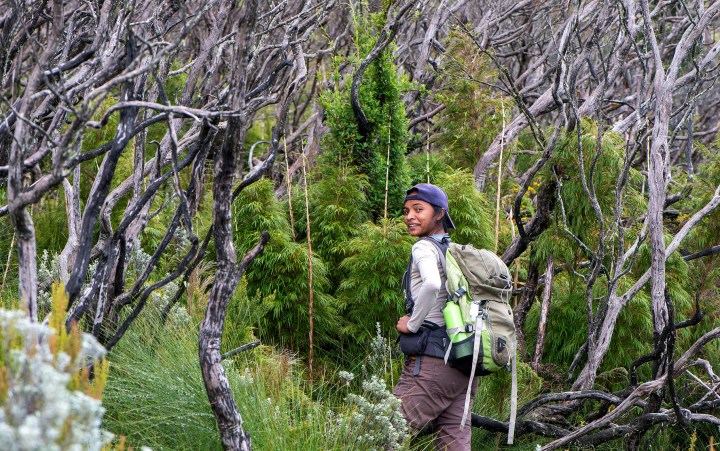
Dr Lovanomenjanahary (Lova) Marline hopes to intensify her studies on a unique and primitive group of plants while monitoring three major threats facing humanity and the global environment – air pollution, climate change and the biological diversity crisis.
Generations of coal miners relied on canaries in cages as an early-warning system to detect toxic or explosive gases. The birds, being more sensitive than humans, would die or get sick first, giving miners a chance to escape or put on protective breathing equipment.
In much the same way, Madagascar-based scientist, Dr Lovanomenjanahary (Lova) Marline, hopes to intensify her studies on a unique and primitive group of plants while monitoring three major threats facing humanity and the global environment – air pollution, climate change and the biological diversity crisis.
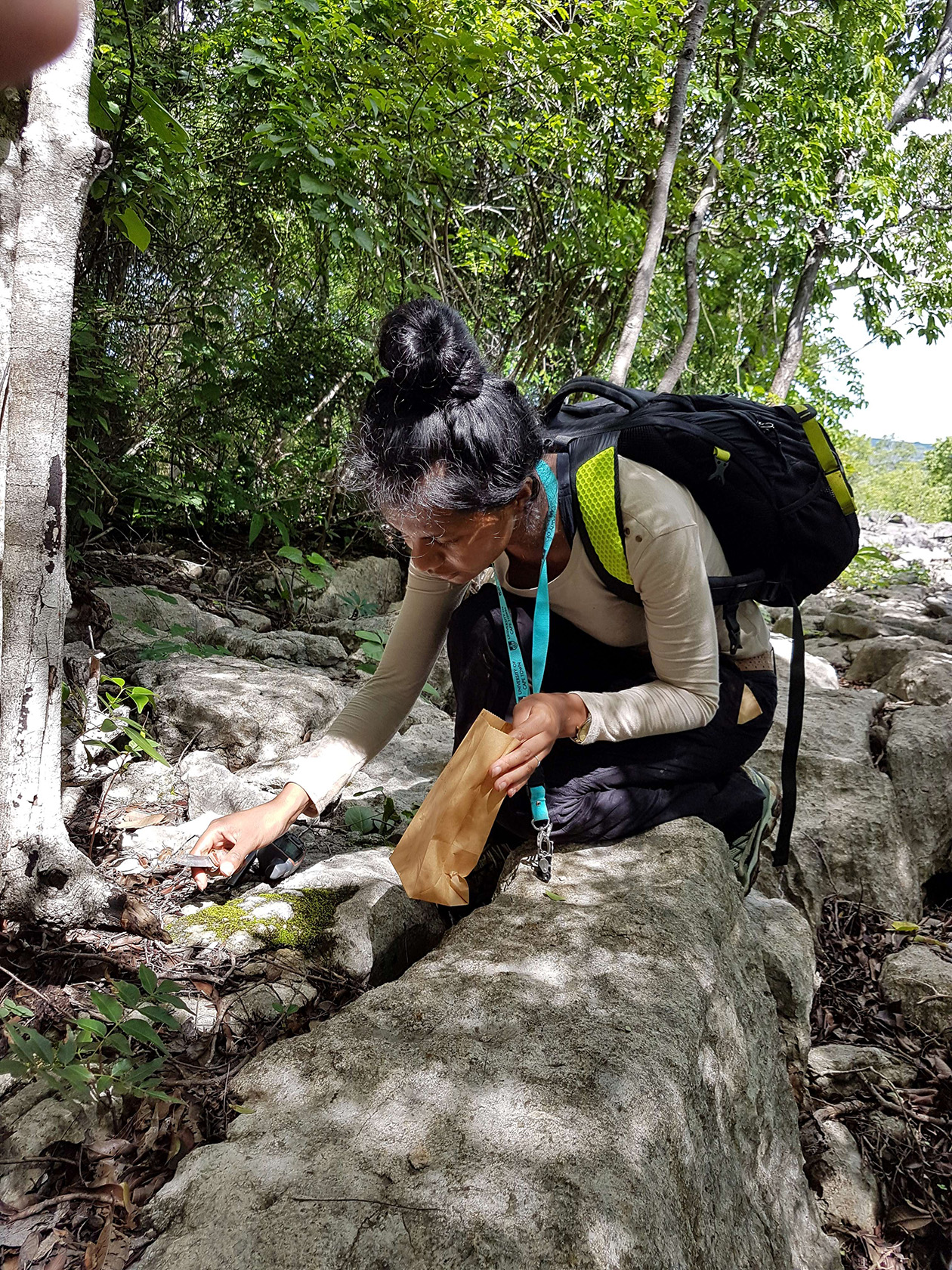
Dr Lova Marline collects bryophytes in Ankara National Park. (Photo: Benny Rice)
The alarm bells she has in mind are bryophytes – small, flowerless plants that collect all the nutrients they need from tiny droplets of water in the air around them.
Marline, a Malagasy “bryologist” attached to the Royal Botanic Gardens in (Kew) London and Association Vahatra in Antananarivo, notes that these environmentally sensitive plants are already used in some countries – mainly in the developed Global North – as a general indicator of ecosystem health or as monitoring tools.
However, they remain “woefully understudied”, especially in Africa, and rarely feature in biological inventories and field research. That’s because research (and research funding) has focused on more charismatic plant and animal groups such as baobabs, orchids, lemurs or the Big Five mammals.
Unlike most other plants, bryophytes (mosses, liverworts and hornworts) have no seeds, veins or proper roots. Globally, there are roughly 25,000 species of bryophytes.
Most live in damp forests, although some can survive in deserts.
“Non-charismatic groups, which include bryophytes and lichens, are often neglected by biologists and are largely unknown to the general public,” she says.
“Yet, they represent one of the great reservoirs of undescribed diversity and could provide numerous insights into understanding environmental challenges that also impact humans.”
Fortunately, this could start to change as Marline has just been awarded the $150,000 (about R2.8-million) Jennifer Ward Oppenheimer Research Grant for her new research project.
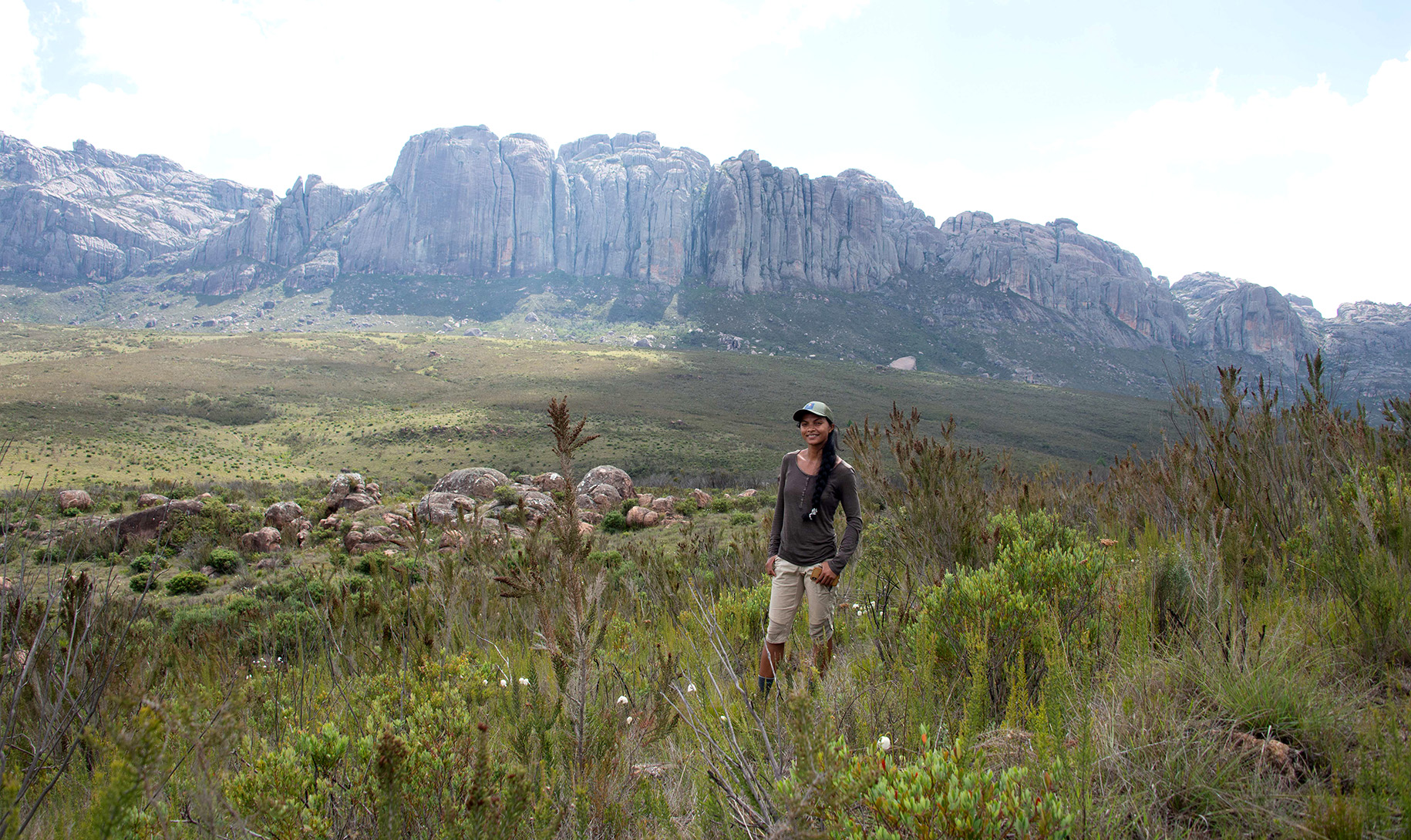
Dr Lova Marline in Andringitra National Park, Madadascar. (Photo: Benny Rice)
The research grant scheme is managed by Oppenheimer Generations Research and Conservation and Oppenheimer Generations Philanthropies and was established five years ago to help early-career scientists develop scientific solutions to African problems.
Marline will also involve scientists and university students from other African nations in her project, which has three main aims:
- To build up a more detailed database of these unique plants in African biodiversity hotspots.
- To help predict the effects of air pollution and climate change on biodiversity in tropical Africa – based on new research in Madagascar, Benin and Ethiopia.
- To map the level of tiny toxic particles and metal-containing air pollutants that damage human health.
In short, she hopes to break “new ground” in understanding the complex links between biodiversity, climate change and air pollution.
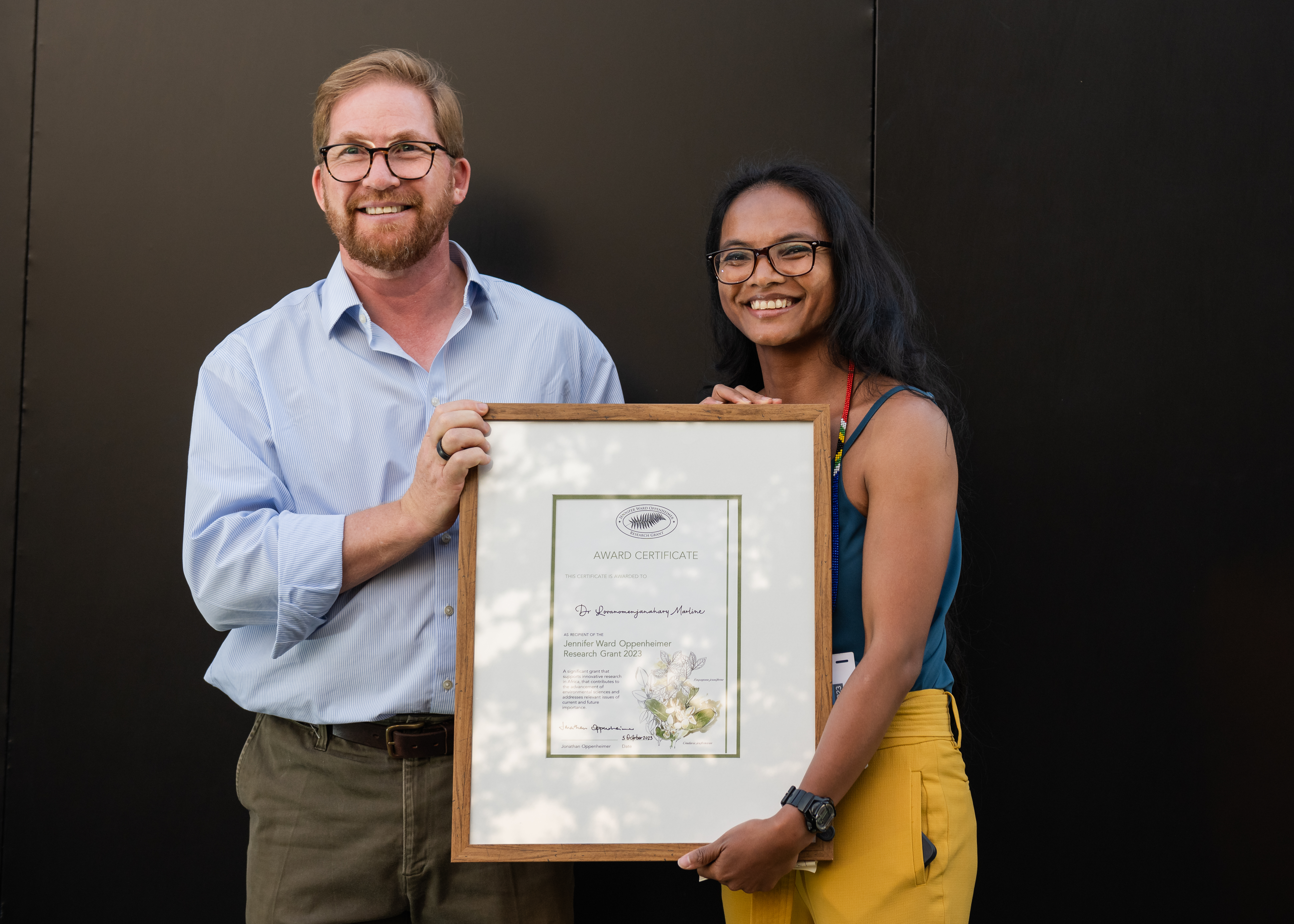
Jonathan Oppenheimer presenting the Jennifer Ward Oppenheimer Research Grant award to Dr Lovanomenjanahary Marline on the evening of 5 October 2023. (Photo supplied)
By drawing this knowledge together, she also hopes to recommend new strategies to stem biodiversity loss, while promoting healthier air for humanity and the environment.
To monitor air pollution, she plans to distribute large numbers of “moss balls” across three nations as a simple and cheap method to measure local air pollution levels in densely populated cities and more isolated rural areas.
While Madagascar is not as industrialised as countries like South Africa or Nigeria, several of its cities and towns are nevertheless heavily polluted from car, motorbike and truck exhaust fumes, while indoor air in many homes is fouled by charcoal fumes.
To further measure pollution levels in real time, the project will deploy a number of more sophisticated (but low-cost) air pollution monitoring systems known as PurpleAir sensors.
These devices are designed to measure fine particulates (specks of polluted dust) that can penetrate human lungs, and ultimately the blood, heart and other vital organs. Data are collected every five seconds and uploaded every two minutes and can be easily accessed from the internet.
However, reliable sources of electrical power for such devices are not always available in parts of Africa.
That’s where the moss balls come in.
They are, literally, tiny balls of moss wrapped in a thin net to allow them to be exposed to the surrounding air when transported to cities or remote rural areas.
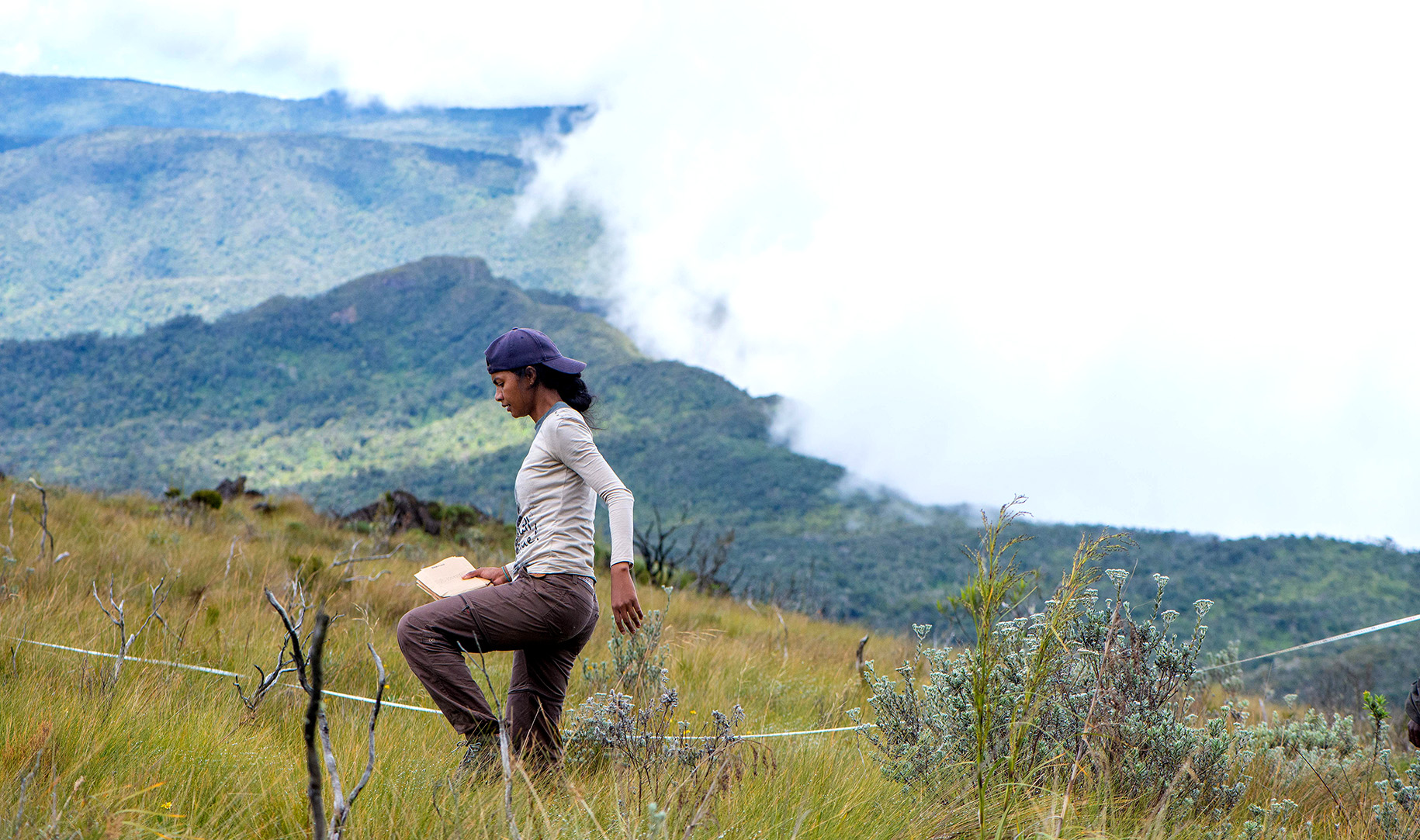
Dr Lova Marline explores for bryophytes in Tsaratanana National Park, the tallest mountain range in Madagascar. (Photo: Benny Rice)
Because bryophytes are very sensitive to environmental stress and accumulate airborne pollutants daily, the balls can be analysed in a laboratory several months later to measure the levels and types of ambient air pollution captured by the moss.
Apart from damaging human health, air pollution adds to global warming by increasing the level of gases that trap heat in the Earth’s atmosphere.
Marline’s study will generate vital baseline data on bryophytes in urban, rural and mountain areas of three Afro-Malagasy countries. This is vital, not just for the sake of increasing scientific knowledge.
It will provide a vital reference point for future studies to test the hypothesis that several plant species are moving from low-lying areas to higher areas in response to climate change – literally moving uphill to remain within temperature niches shaped by centuries of evolution.
“Mountains are the best candidates for comparative studies on the impact of climate change on the future of biodiversity and ecosystem functioning,” she notes.
At a personal level, Marline is deeply gratified to have won the 2023 JWO Research Grant as it allows her to continue working as an independent bryophyte researcher in her home nation.
Sadly, she says, government funding for environmental research remains extremely thin in Madagascar, despite several studies which show that this massive island is a global centre of bryophyte diversity and endemism – and the most species-rich area of bryophytes in Africa.
Marline grew up in a small town about 160km from the capital, where her interest in science was stimulated by her parents.
“Mum was a biology teacher and my dad a maths teacher, so we always talked science at home.”
Her specific focus on botany developed gradually during her studies at the University of Antananarivo, followed by her doctoral studies at the University of Cape Town.
Now, as a postdoctoral researcher, she is part of a very specialised group of 35 bryophyte volunteer experts from across the world who make up the International Union for the Conservation of Nature Species Survival Commission (Bryophyte Specialist Group), which works to raise public awareness and to assess the extinction risks for this understudied plant family.
“We are still a very small group. I wanted to call us the ‘bryobabes’ (short for ‘bryophyte babes’) but my proposal did not take off,” she laughs.
Away from her computer and laboratory work, she keeps fit by dancing or hiking, and she “loves cooking”. DM
This article was commissioned by Jive Media Africa, science communications partner to Oppenheimer Generations Research and Conservation.
Tony Carnie is an environmental journalist with Daily Maverick, based in Durban.


















Inspirational! Thanks for sharing.
Yes, we do need to celebrate the many incredible young scientists and artists throughout this glorious continent of Africa, who are really changing the world, and not just sitting back and whingeing about it. They will prevail! Power to Lovanomenjanahary – and I love the Mallagasy names!
Great project
But how do you study the effects of climate change over a period of months?
Strike me as just another example of throwing climate change in to get approval for study and the funding to carry it out.
Of course then there will have to be a funding of the impact of climate change in order to get it published.
The effects of pollution are far more damaging. Especially in cities or households with indoor fires for cooking
Oh shame, such sad cynicism. Maybe read the article a bit more carefully and not through this cynical lens, and you might learn something. And pollution is, of course part of the same story – the dreadful damage we are doing to our planet and our own life support systems.